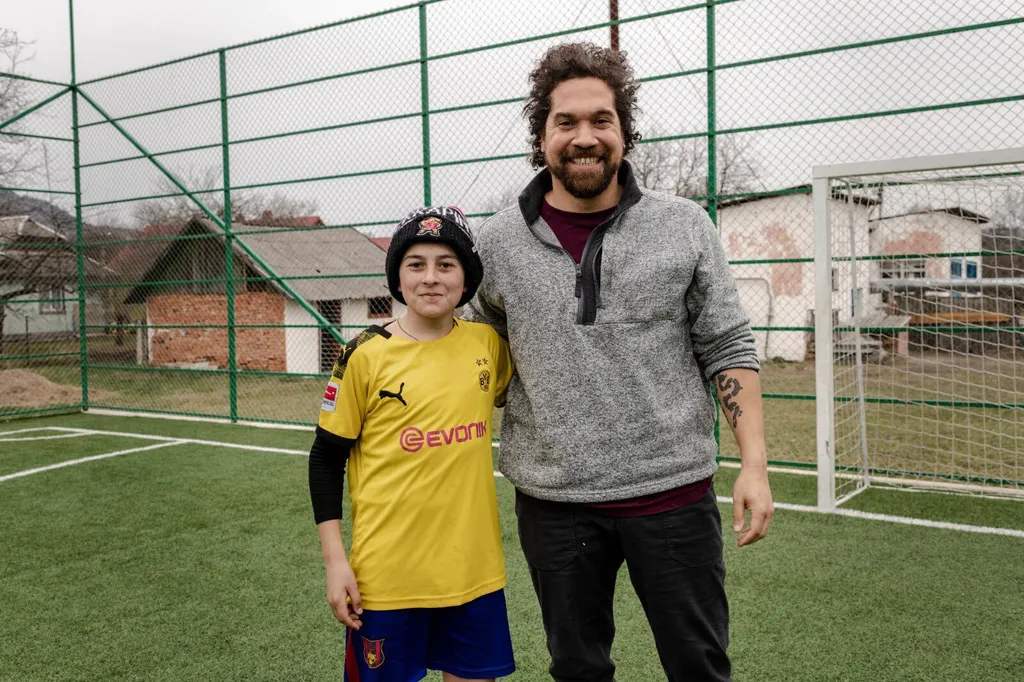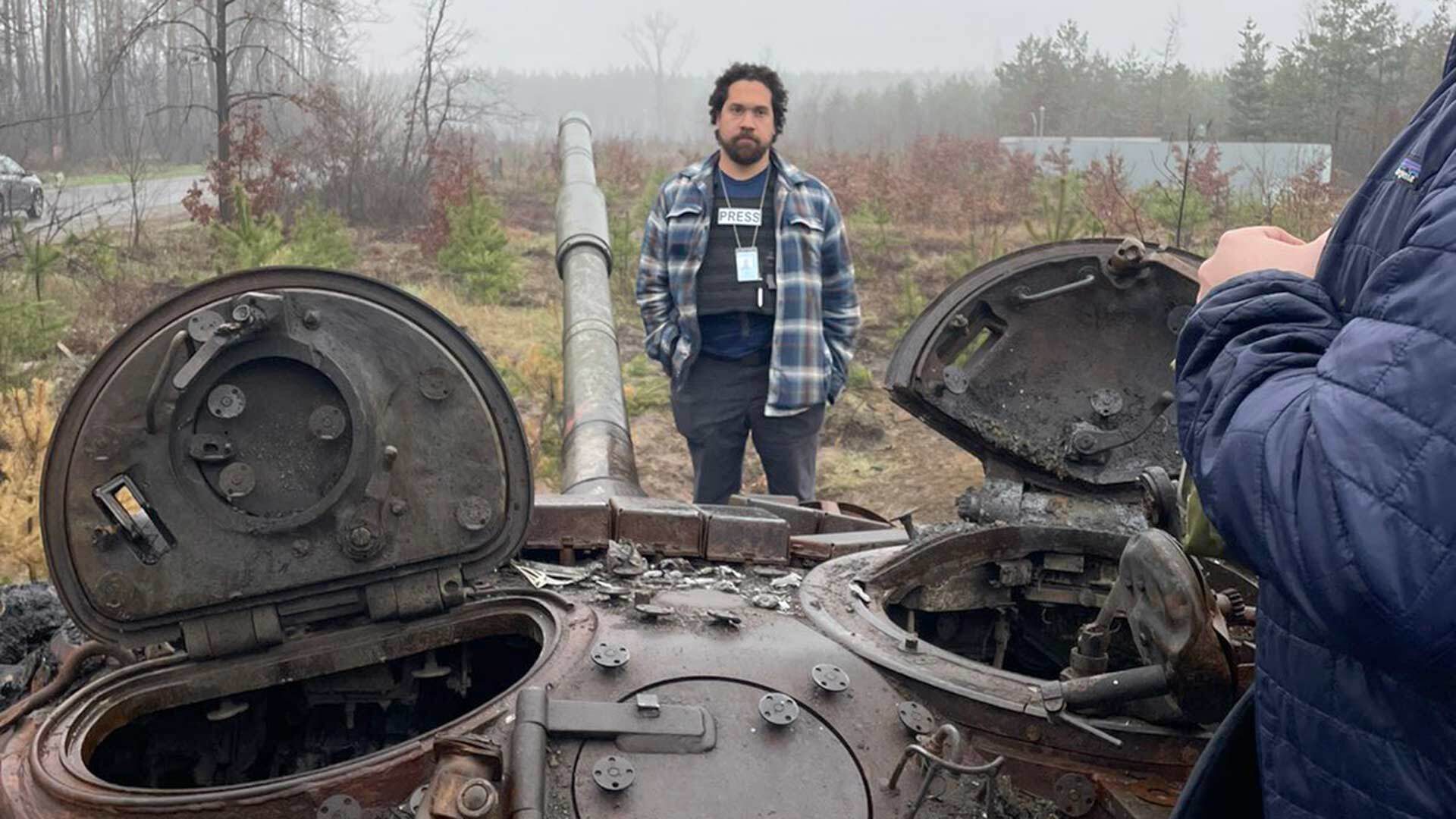- April 25, 2022
- By Karen Shih ’09
During Robert Klemko’s first trip to Ukraine during high school, his cousins joked that their biggest concern was that he and his dad would be kidnapped for ransom.
Nearly two decades later, Klemko ’10 is back—and this time he faces genuine danger. He’s chronicling the cost of war in his father’s homeland, wearing a bulletproof vest, helmet and press credentials from The Washington Post. The former NFL writer is wrapping up a month of reporting, covering the careful cataloging of war crimes by Ukrainian prosecutors; the ingenuity of filmmakers and artists who have pivoted to sourcing military supplies; and foreigners seeking to join the Ukrainian forces.
Klemko talked to Maryland Today about why he volunteered for the assignment abroad, his emotional return to the country and why his Terp beanie stayed behind in Ukraine.
War isn’t your usual beat, which is now policing and criminal justice reform after you spent seven years covering sports. Why did you go to Ukraine?
It’s such an enormous story, with so many human consequences. The Post realized a lot of foreign correspondents needed a break. They asked for volunteers from the newsroom. Being half Ukrainian and having always wanted to cover a war, I felt like if I was ever going to do it, I needed to do it now. The hardest thing is that my son is just 10 months old, so you’re missing a lot when you miss a month at that age.
When I decided to volunteer, I thought a lot about my dad. He took me to Poltava when I was 16 years old, where we have cousins. I had the most amazing experience and memories. When I came back this time, all the smells hit me as soon as I rolled the window down. Burning piles of sticks in the countryside. The amazing food. It’s really emotional being back here 18 years later.
What has the experience been like?
I don’t have a lot of experience as a war correspondent, so they kept me in Lviv for a couple weeks to get my bearings. And now that I’m in Kyiv, the front has moved further east. I feel like I'm on the sidelines, but I’m not complaining—I didn’t come to see people exchange gunfire. I came to write about everyday people whose lives are embroiled in this war.
A lot of stories we end up doing are the ideas of our producers. They have a whole different perspective. They often serve as our translator and driver, or possibly as a photographer or videographer. Foreign journalists are only as good as their fixers.
My latest piece is about the coroner in Kyiv, whose job is just to process this onslaught of dead bodies. It was really difficult—I wanted to be able to describe everything he does. They let me into the room where the bodies are. It was just a nightmare. I try to describe it, but you can’t do it justice. It’s just something you have to see.
What are some of the biggest challenges?
Logistics. You’re constantly figuring out travel, and which producers are available and what they can do. Getting approval from security advisors in London. Making sure you’re in a hotel with a bomb shelter. Making sure you have a kit for a chemical weapon attack, body armor and a helmet. It complicates the job because you want to spend it all on storytelling. That’s why people get burnt out. It’s a lot of stuff we’re not experts at.
Some of our most complicated interactions are with soldiers at checkpoints. There’s a constant threat here that there are Russian infiltrators in Ukraine. They can look and sound like Ukrainians, which is why there’s been this movement here to eliminate the Russian language in wartime. They scrutinize people identifying themselves as press, because they fear it could be used as a cover. With a press sticker on our car, we always get stopped because they want to check our documents and hear me speak English.

You posted on Twitter about your game of soccer with some boys who had escaped from Bucha and Irpin. Why is it important for you to show that side of society while you’re there?
What’s hard to appreciate about war is that there are a lot of people still just living their lives. You underestimate how quickly people can move on and move forward. There’s this sense you need to laugh to keep from crying.
I saw some kids out back playing soccer, and I let them score on me because I wanted to give them my hat. Imagine being 10, 11, 12 years old and you can’t go home because it’s being bombed. You don’t know if you’ll ever see your parents or friends again. Sports were always that outlet and distraction from things that bothered me, so I wanted to share that with them.
Is there anything about in particular about this war that you want people to understand?
I think the key thing is understanding the war in Donbas that began in 2014. When you talk about the war here, Ukrainians correct you. They say it didn’t start two months ago—it started in 2014. News outlets started using term “full-scale invasion” instead of just “invasion” or “war.” I encourage people to learn more about Russia and its tactics. Look up the war in Donbas. That will put it all in much better perspective.
Topics
People